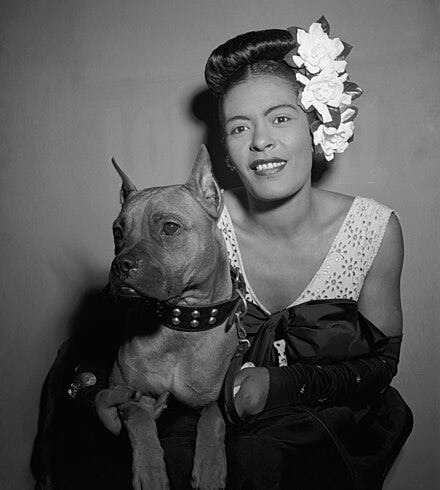Today In Black History: Billie Holiday
Influential and award-winning jazz singer.
Issue #680 Today In Black History, Thursday, July 25, 2024
Did you know that you can listen to each “We Are Speaking” post on the Substack App? Download the app!
Help us to reach our July 2024 goals: +100 total new subscribers, including +15 paid subscribers:
Please share and subscribe to help us grow our publication.
Who are your “Fav Five” who would enjoy “We Are Speaking?” Send them the link!
If you like us, REALLY like us, please click the “Like” button at the end of this post!
We appreciate your support!
Today’s Black History WOW!
Billie Holiday was born Eleanora Fagan to teenage parents on April 7, 1915, in Philadelphia, Pennsylvania. She was nicknamed "Lady Day" by her friend and music partner, Lester Young, and she made a significant contribution to jazz music and pop singing. Her vocal style, strongly influenced by jazz instrumentalists, inspired a new way of manipulating phrasing and tempo. She was known for her vocal delivery and improvisational skills.
Holiday was largely raised by her mother, Sadie, under challenging economic conditions in Baltimore, Maryland. She began singing in Harlem nightclubs as a teenager, where her unique vocal style caught the attention of talent scout John Hammond. In 1933, she recorded her first tracks with Benny Goodman.
By the late 1930s, she was performing with the top orchestras of the day, including those led by Count Basie and Artie Shaw. Her distinctive voice, characterized by its emotive phrasing and unique timbre, set her apart from her contemporaries. Her music was further enhanced by her innovative use of tempo and rhythm.
Despite her immense talent, Holiday's career was profoundly affected by the pervasive racism of the time, including being denied entry through the front doors of the clubs where she performed and being prohibited from using the same facilities as white patrons and fellow musicians.
One of her most iconic and controversial songs, "Strange Fruit," is a haunting protest against the lynching of African Americans with its powerful imagery and emotional delivery. The song faced significant resistance from record labels and radio stations, yet it has endured as a poignant symbol of the civil rights struggle.
Holiday's personal life was marred by struggles with drug and alcohol addiction, exacerbated by the pressures of her career and the trauma of her experiences with racism and abuse. These issues led to numerous legal troubles, including a highly publicized arrest and imprisonment for drug possession in 1947. Her cabaret card, which allowed her to perform in New York City nightclubs, was revoked, severely limiting her ability to earn a living.
Billie Holiday won numerous awards after the end of her musical career:
1987, Billie Holiday was posthumously awarded the Grammy Lifetime Achievement Award.
1994, the United States Postal Service introduced a Billie Holiday postage stamp.
2000, she was inducted into the Rock and Roll Hall of Fame.
2011, she was inducted into the National Women's Hall of Fame.
Holiday is remembered as a trailblazer who used her artistry to confront and highlight the injustices of her time, particularly those related to race. Her life story has been the subject of numerous books, films, and documentaries, including the critically acclaimed 1972 film "Lady Sings the Blues," starring Diana Ross.
By early 1959, Holiday was diagnosed with cirrhosis of the liver. On May 31, 1959, Holiday was finally taken to Metropolitan Hospital in New York for treatment of both liver and heart disease. While in hospital, narcotics police came to her hospital room and placed her under house arrest for narcotics possession. On July 15, she received last rites, and on July 17, 1959, Billie “Lady Day” Holiday died at age 44 of pulmonary edema and heart failure caused by cirrhosis of the liver.
Today In Black History
In 1916, Garett T. Morgan, the Black inventor of the gas mask, used his invention to rescue six men from a gas-filled tunnel in Cleveland, Ohio.
In 1921, the Liberty Life Insurance Company, a forerunner to the Supreme Life Insurance Company, was founded by Frank L. Gillespie.
In 1943, the first warship named for a Black person (1st Class Leonard Roy Harmon), the SS Harmon, was launched in Quincy, Massachusetts.
In 1952, Puerto Rico became a self-governing U.S. commonwealth.
In 1972, the U.S. government finally admitted that Black people were used as guinea pigs in syphilis experiments known as the Tuskegee Syphilis Experiment.
In 1992, General Colin Powell, the then-chairman of the Joint Chiefs of Staff, dedicated the Buffalo Soldiers Monument at Fort Leavenworth, Kansas.
In 2023, President Joe Biden signed a proclamation establishing the Emmett Till and Mamie Till-Mobley National Monuments located in Mississippi and Illinois.
Our paid subscribers are encouraged to discuss this post in our W.A.S. Chat Community.
Join Pamela Hilliard Owens’s subscriber chat
Available in the Substack app and on the web
You are also welcome to view “We Are Speaking” in Substack Notes. You can also read other Substack publications without subscribing to them when you join Notes.






